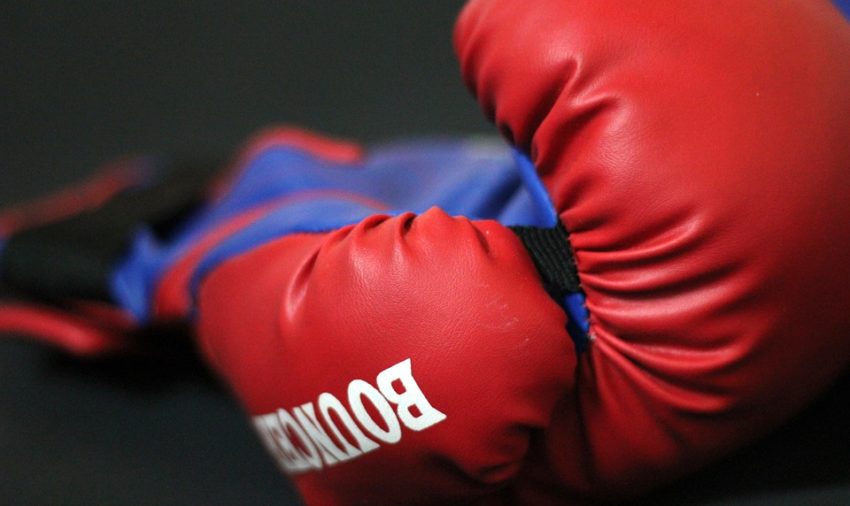
Russia and Ukraine stand in each their corner of the ring and punch at each other. From time to time the referee goes down, mostly hit by himself. The countdown is now hanging over him. If he doesn’t get up in time, he will have lost the match on knock out.
No matter who wins this boxing match, then it is already a part of the history books for various reasons.
- For the first time in the history of the Eurovision Song Contest, it’s a boxing match deciding who can take part
- The match started back in May 2016 and now, in March 2017, we still haven’t found a winner
- Despite some quite nasty punches thrown at each other, none of the fighters are the slightest bit injured
- The referee is in serious danger of losing on knockout as he hits himself
Round 1
Despite protests about the song, titled 1944, being political and anti-Russia, EBU approved Jamala’s Eurovision entry for the 2016 contest. It won – and Ukraine were to hold the 2017 competition. Instead of focusing on the important tasks like finding a suitable arena and begin the preparations, Ukraine set up a boxing ring and dragged Russia into it as their opponent.
They had barely had time to celebrate their Eurovision victory before Parliament Member Anton Gerashchenko started the fight and threw the first punch at Russia. He made the world aware of their blacklist containing several Russian artists, and pleaded for an expansion of it in order to control who Russia would select for Eurovision. At this point Russia chose to ignore his punch, and the referee hadn’t yet arrived to the boxing ring.
Round 2
A few months later, in September, Ukraine throws the second punch at Russia. Their Minister of Culture confirmed that this black lists will be used to keep certain Russian artists out of Ukraine. Eurovision or not, artists on that list aren’t allowed to enter. This is where EBU (The European Broadcasting Union) steps into the boxing ring. As the referee they make it clear that they are telling Ukraine that they as host country is obligated to “ensure that all delegates and artists can come and stay in Ukraine“.
Russia still hasn’t done anything at this point. They stand still in their corner and accepts the punches thrown towards them, but now they have the referee to protect them. That referee tells in December that despite talks of moving the contest, Ukraine remain host country for the 2017 Eurovision Song Contest. They are in constant dialogue and conclude that they are so far with their negotiations that Ukraine won’t cause problems for any of the participants, the delegations or press and fans.
Shortly after, everyone leaves the boxing ring as Ukraine has their own internal problems to deal with now. It is the general opinion that the referee solved the problem with a compromise where Russia most likely promised not to select an artist from the blacklist, and Ukraine promised not to cause problems for whoever they might choose instead. The planning of the Eurovision Song Contest which already suffered several delays, is once again in jeopardy as the broadcaster NTU’s Core Team behind the contest resigns in the middle of February. With only a few months left, EBU take control and bring in Swedish expertise to save the contest.
Round 3
In March, Russia select Julia Samojlova to represent them at the contest in Kyiv. While fans and press are discussing whether or not they selected her because of her handicap in order to avoid being boo’ed at due to their anti-gay laws, Russia are actually on the way to the boxing ring. At this point most aren’t yet aware that Julia has performed in the Russian occupied Crimea – without access permission from the authorities in Ukraine.
10 days later, Ukraine have looked into who Julia Samojlova is, and despite that she wasn’t on their blacklist, they issue a ban which stops her from entering the country. She has, with her unauthorised entering of Crimea broken Ukrainian law, and as such they won’t let her in. It appears like it is this punch at Russia, which makes EBU as referee kick themselves. They no longer talk about Ukraine’s host country obligation of allowing access for all participants which are approved by EBU. Instead they issue a double standard statement saying they must respect Ukrainian law. At the same time, they continue their negotiations in order to make sure that all participants, including the Russian, can enter Ukraine for the 2017 contest.
The Head Referee Jon Ola Sand (Executive Supervisor of the Eurovision Song Contest) even appears on video. That video does him no good as he looks clearly stressed and in doubt about what to do. He is not the confident referee who can stop this boxing fight before it gets out of control.
Round 4
EBU seem more perplexed than competent, as demonstrated the next day. They present a solution to have Russia participate in the competition via satellite from Moscow. A desperate attempt, but if that is what it takes, let’s try it. While everyone accept this as a fact, and discuss whether or not this gives an advantage to the Russian participant, next throw is aimed directly at EBU and it comes just a few hours later.
The referee begins to fall as Ukraine turn down “the satellite solution”. Now the problems isn’t just Julia entering the country, but also any appearance of her on Ukrainian TV. They make it clear that any artist who has performed, thus visited, in Crimea without their permission must not get any publicity in Ukraine. With that they give EBU new challenges as this could give problems in the future as well, no matter where the contest is held.
While the referee is almost down, Russian broadcaster Channel 1 also replies to the alternative solution, and this is where EBU is knocked out. Russia simply make aware of that they have chosen their artist in accordance to the rules of the contest, that EBU approved of her, and that it is the host country’s obligation to provide all participants “the opportunity to obtain an entry visa for the entire period of the event”.
No one can deny that Channel 1 are right. No matter if you might think that Russia provoked unnecessarily by selecting Julia, Ukraine do have their host country obligations to live up to. Julia wasn’t on the blacklist and EBU approved of her and the song Flame Is Burning. When the referee went down, it wasn’t actually by a punch set in by the Russians either, as EBU hit themselves by publicly suggesting something which they obviously hadn’t clear with neither Russia or Ukraine.
Both parts now stand in each their corner looking at the referee who is lying in the floor, clearly injured. Will any of them offer a helping hand or can EBU get up by themselves? Time will tell. We are at a cliffhanger now, and will have to wait for next chapter to see what happens.
This reflection article is based on the author's own personal experience. Views expressed belongs to him or her, and are to be seen as unrelated to EuroVisionary.com.



















